Zara's Retail Theory and Practice: UK Fashion Market Analysis Report
VerifiedAdded on 2021/02/19
|11
|3407
|41
Report
AI Summary
This report provides a comprehensive analysis of Zara's retail theory and practice within the UK fashion market. It begins with an introduction to Zara, a Spanish fashion retailer, and an overview of the UK clothing market's growth. The main body of the report delves into the key changes in the UK fashion market, utilizing PESTLE analysis to examine political, economic, social, technological, legal, and environmental factors. It also explores the micro-environment of Zara, including its resources, employees, suppliers, and competitors. The report then outlines strategies and tactics that Zara can employ to respond to these changes, focusing on adapting to macro and micro environmental shifts. The report concludes with a summary of findings and references.
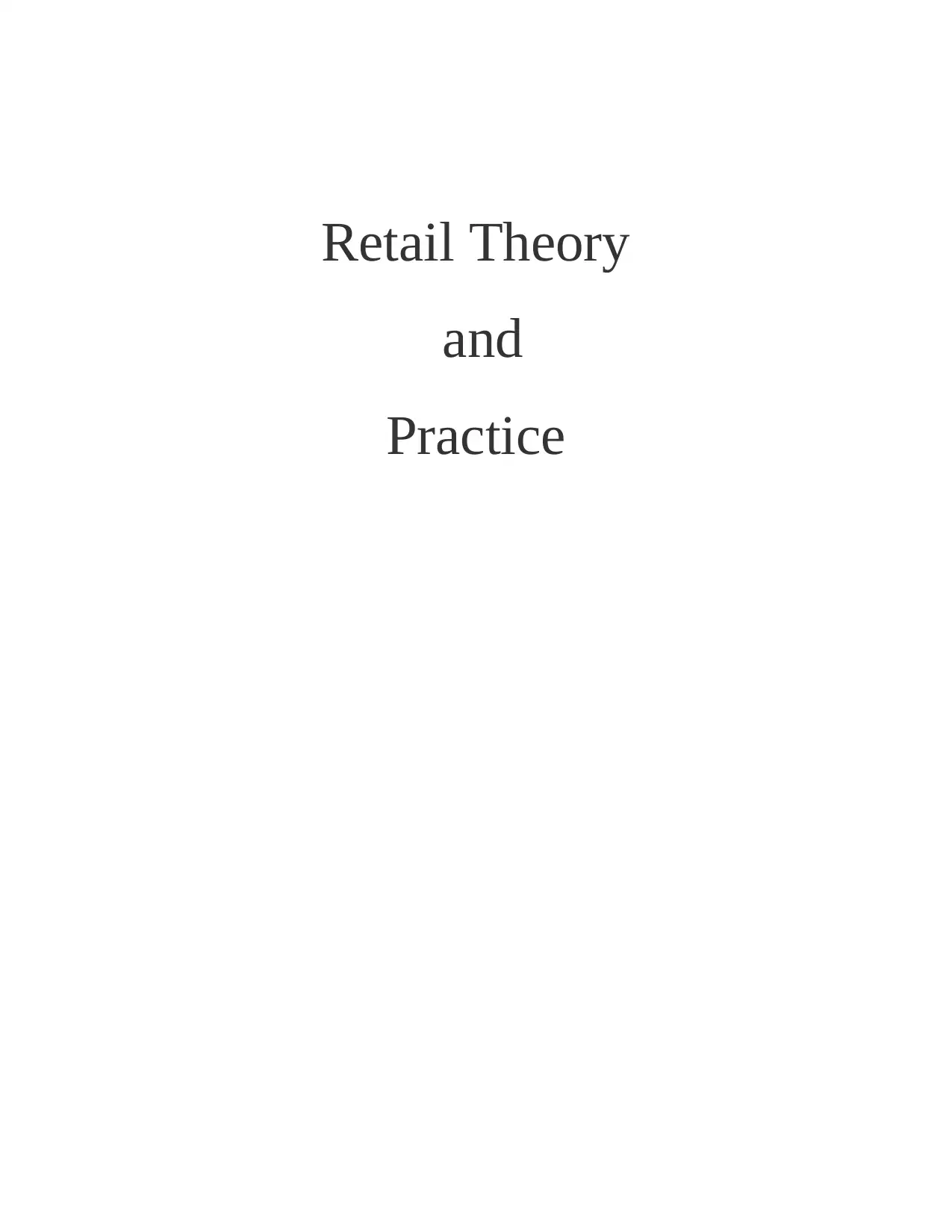
Retail Theory
and
Practice
and
Practice
Paraphrase This Document
Need a fresh take? Get an instant paraphrase of this document with our AI Paraphraser
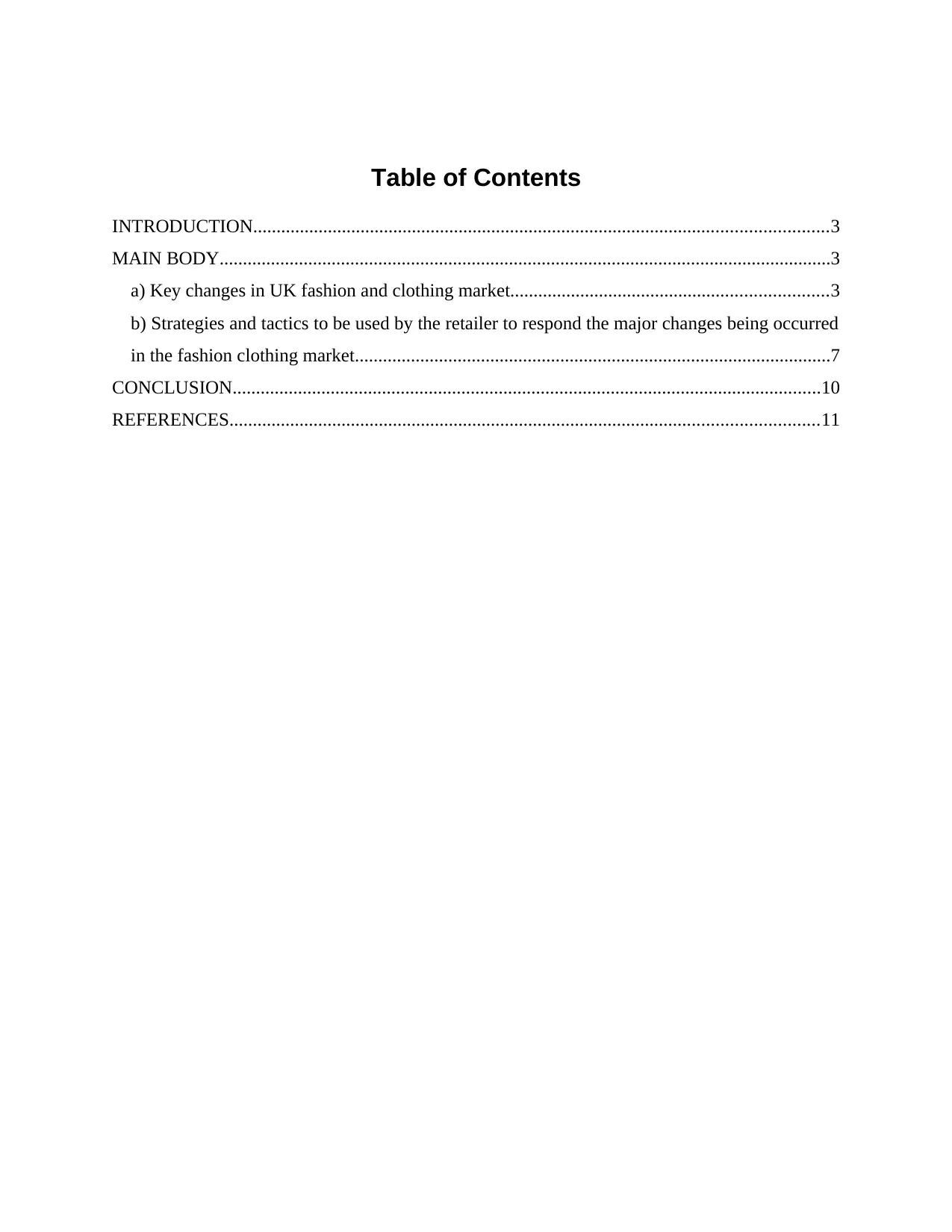
Table of Contents
INTRODUCTION...........................................................................................................................3
MAIN BODY...................................................................................................................................3
a) Key changes in UK fashion and clothing market....................................................................3
b) Strategies and tactics to be used by the retailer to respond the major changes being occurred
in the fashion clothing market......................................................................................................7
CONCLUSION..............................................................................................................................10
REFERENCES..............................................................................................................................11
INTRODUCTION...........................................................................................................................3
MAIN BODY...................................................................................................................................3
a) Key changes in UK fashion and clothing market....................................................................3
b) Strategies and tactics to be used by the retailer to respond the major changes being occurred
in the fashion clothing market......................................................................................................7
CONCLUSION..............................................................................................................................10
REFERENCES..............................................................................................................................11
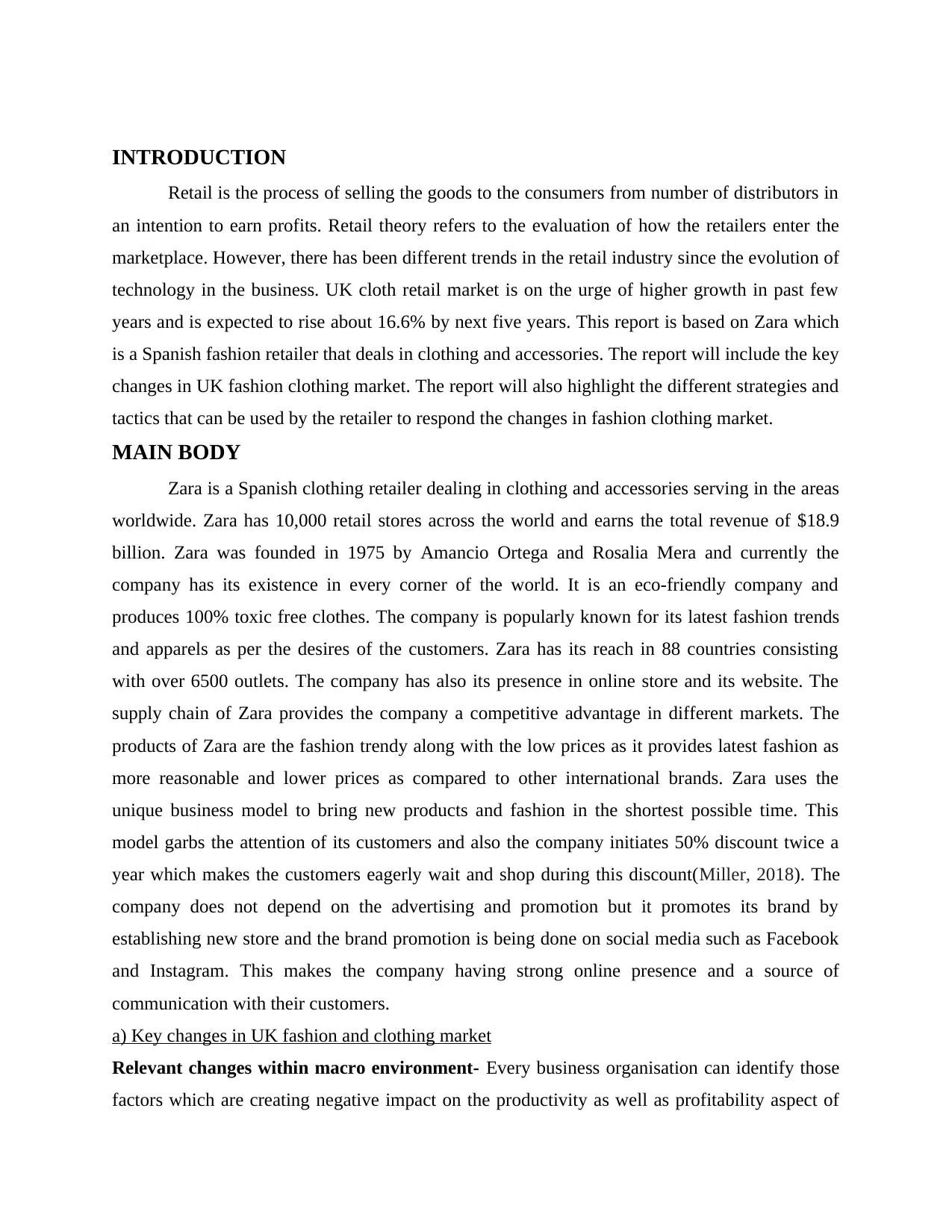
INTRODUCTION
Retail is the process of selling the goods to the consumers from number of distributors in
an intention to earn profits. Retail theory refers to the evaluation of how the retailers enter the
marketplace. However, there has been different trends in the retail industry since the evolution of
technology in the business. UK cloth retail market is on the urge of higher growth in past few
years and is expected to rise about 16.6% by next five years. This report is based on Zara which
is a Spanish fashion retailer that deals in clothing and accessories. The report will include the key
changes in UK fashion clothing market. The report will also highlight the different strategies and
tactics that can be used by the retailer to respond the changes in fashion clothing market.
MAIN BODY
Zara is a Spanish clothing retailer dealing in clothing and accessories serving in the areas
worldwide. Zara has 10,000 retail stores across the world and earns the total revenue of $18.9
billion. Zara was founded in 1975 by Amancio Ortega and Rosalia Mera and currently the
company has its existence in every corner of the world. It is an eco-friendly company and
produces 100% toxic free clothes. The company is popularly known for its latest fashion trends
and apparels as per the desires of the customers. Zara has its reach in 88 countries consisting
with over 6500 outlets. The company has also its presence in online store and its website. The
supply chain of Zara provides the company a competitive advantage in different markets. The
products of Zara are the fashion trendy along with the low prices as it provides latest fashion as
more reasonable and lower prices as compared to other international brands. Zara uses the
unique business model to bring new products and fashion in the shortest possible time. This
model garbs the attention of its customers and also the company initiates 50% discount twice a
year which makes the customers eagerly wait and shop during this discount(Miller, 2018). The
company does not depend on the advertising and promotion but it promotes its brand by
establishing new store and the brand promotion is being done on social media such as Facebook
and Instagram. This makes the company having strong online presence and a source of
communication with their customers.
a) Key changes in UK fashion and clothing market
Relevant changes within macro environment- Every business organisation can identify those
factors which are creating negative impact on the productivity as well as profitability aspect of
Retail is the process of selling the goods to the consumers from number of distributors in
an intention to earn profits. Retail theory refers to the evaluation of how the retailers enter the
marketplace. However, there has been different trends in the retail industry since the evolution of
technology in the business. UK cloth retail market is on the urge of higher growth in past few
years and is expected to rise about 16.6% by next five years. This report is based on Zara which
is a Spanish fashion retailer that deals in clothing and accessories. The report will include the key
changes in UK fashion clothing market. The report will also highlight the different strategies and
tactics that can be used by the retailer to respond the changes in fashion clothing market.
MAIN BODY
Zara is a Spanish clothing retailer dealing in clothing and accessories serving in the areas
worldwide. Zara has 10,000 retail stores across the world and earns the total revenue of $18.9
billion. Zara was founded in 1975 by Amancio Ortega and Rosalia Mera and currently the
company has its existence in every corner of the world. It is an eco-friendly company and
produces 100% toxic free clothes. The company is popularly known for its latest fashion trends
and apparels as per the desires of the customers. Zara has its reach in 88 countries consisting
with over 6500 outlets. The company has also its presence in online store and its website. The
supply chain of Zara provides the company a competitive advantage in different markets. The
products of Zara are the fashion trendy along with the low prices as it provides latest fashion as
more reasonable and lower prices as compared to other international brands. Zara uses the
unique business model to bring new products and fashion in the shortest possible time. This
model garbs the attention of its customers and also the company initiates 50% discount twice a
year which makes the customers eagerly wait and shop during this discount(Miller, 2018). The
company does not depend on the advertising and promotion but it promotes its brand by
establishing new store and the brand promotion is being done on social media such as Facebook
and Instagram. This makes the company having strong online presence and a source of
communication with their customers.
a) Key changes in UK fashion and clothing market
Relevant changes within macro environment- Every business organisation can identify those
factors which are creating negative impact on the productivity as well as profitability aspect of
⊘ This is a preview!⊘
Do you want full access?
Subscribe today to unlock all pages.

Trusted by 1+ million students worldwide
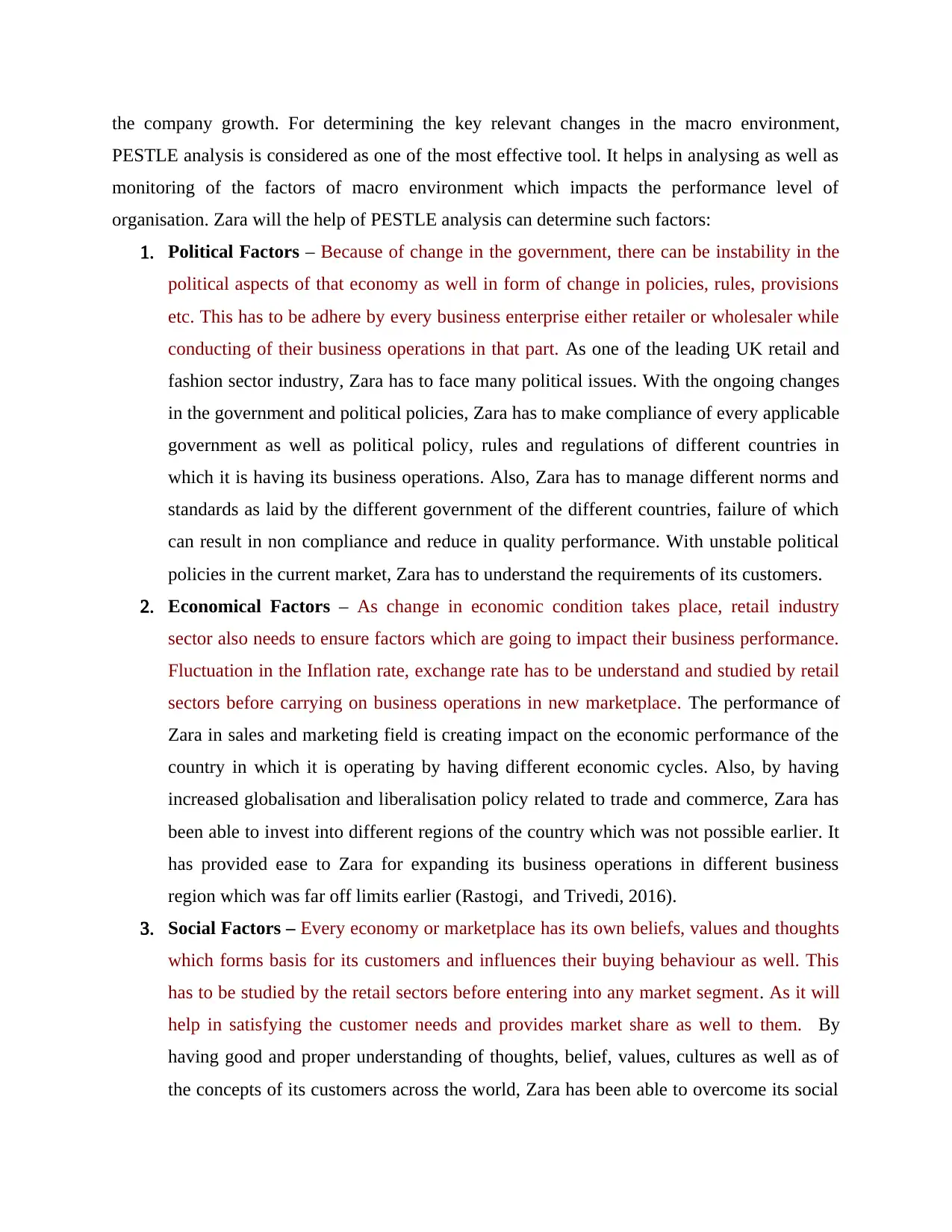
the company growth. For determining the key relevant changes in the macro environment,
PESTLE analysis is considered as one of the most effective tool. It helps in analysing as well as
monitoring of the factors of macro environment which impacts the performance level of
organisation. Zara will the help of PESTLE analysis can determine such factors:
1. Political Factors – Because of change in the government, there can be instability in the
political aspects of that economy as well in form of change in policies, rules, provisions
etc. This has to be adhere by every business enterprise either retailer or wholesaler while
conducting of their business operations in that part. As one of the leading UK retail and
fashion sector industry, Zara has to face many political issues. With the ongoing changes
in the government and political policies, Zara has to make compliance of every applicable
government as well as political policy, rules and regulations of different countries in
which it is having its business operations. Also, Zara has to manage different norms and
standards as laid by the different government of the different countries, failure of which
can result in non compliance and reduce in quality performance. With unstable political
policies in the current market, Zara has to understand the requirements of its customers.
2. Economical Factors – As change in economic condition takes place, retail industry
sector also needs to ensure factors which are going to impact their business performance.
Fluctuation in the Inflation rate, exchange rate has to be understand and studied by retail
sectors before carrying on business operations in new marketplace. The performance of
Zara in sales and marketing field is creating impact on the economic performance of the
country in which it is operating by having different economic cycles. Also, by having
increased globalisation and liberalisation policy related to trade and commerce, Zara has
been able to invest into different regions of the country which was not possible earlier. It
has provided ease to Zara for expanding its business operations in different business
region which was far off limits earlier (Rastogi, and Trivedi, 2016).
3. Social Factors – Every economy or marketplace has its own beliefs, values and thoughts
which forms basis for its customers and influences their buying behaviour as well. This
has to be studied by the retail sectors before entering into any market segment. As it will
help in satisfying the customer needs and provides market share as well to them. By
having good and proper understanding of thoughts, belief, values, cultures as well as of
the concepts of its customers across the world, Zara has been able to overcome its social
PESTLE analysis is considered as one of the most effective tool. It helps in analysing as well as
monitoring of the factors of macro environment which impacts the performance level of
organisation. Zara will the help of PESTLE analysis can determine such factors:
1. Political Factors – Because of change in the government, there can be instability in the
political aspects of that economy as well in form of change in policies, rules, provisions
etc. This has to be adhere by every business enterprise either retailer or wholesaler while
conducting of their business operations in that part. As one of the leading UK retail and
fashion sector industry, Zara has to face many political issues. With the ongoing changes
in the government and political policies, Zara has to make compliance of every applicable
government as well as political policy, rules and regulations of different countries in
which it is having its business operations. Also, Zara has to manage different norms and
standards as laid by the different government of the different countries, failure of which
can result in non compliance and reduce in quality performance. With unstable political
policies in the current market, Zara has to understand the requirements of its customers.
2. Economical Factors – As change in economic condition takes place, retail industry
sector also needs to ensure factors which are going to impact their business performance.
Fluctuation in the Inflation rate, exchange rate has to be understand and studied by retail
sectors before carrying on business operations in new marketplace. The performance of
Zara in sales and marketing field is creating impact on the economic performance of the
country in which it is operating by having different economic cycles. Also, by having
increased globalisation and liberalisation policy related to trade and commerce, Zara has
been able to invest into different regions of the country which was not possible earlier. It
has provided ease to Zara for expanding its business operations in different business
region which was far off limits earlier (Rastogi, and Trivedi, 2016).
3. Social Factors – Every economy or marketplace has its own beliefs, values and thoughts
which forms basis for its customers and influences their buying behaviour as well. This
has to be studied by the retail sectors before entering into any market segment. As it will
help in satisfying the customer needs and provides market share as well to them. By
having good and proper understanding of thoughts, belief, values, cultures as well as of
the concepts of its customers across the world, Zara has been able to overcome its social
Paraphrase This Document
Need a fresh take? Get an instant paraphrase of this document with our AI Paraphraser
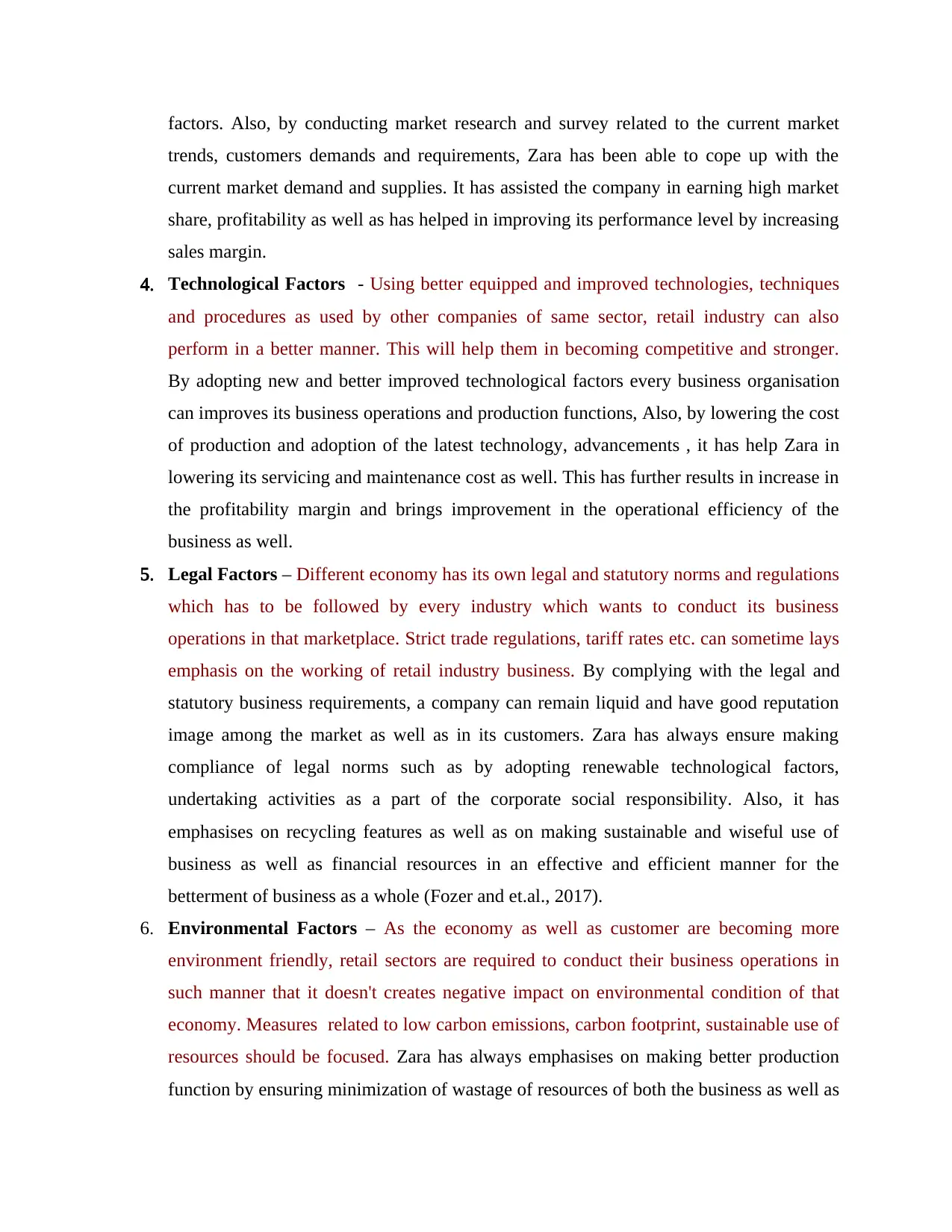
factors. Also, by conducting market research and survey related to the current market
trends, customers demands and requirements, Zara has been able to cope up with the
current market demand and supplies. It has assisted the company in earning high market
share, profitability as well as has helped in improving its performance level by increasing
sales margin.
4. Technological Factors - Using better equipped and improved technologies, techniques
and procedures as used by other companies of same sector, retail industry can also
perform in a better manner. This will help them in becoming competitive and stronger.
By adopting new and better improved technological factors every business organisation
can improves its business operations and production functions, Also, by lowering the cost
of production and adoption of the latest technology, advancements , it has help Zara in
lowering its servicing and maintenance cost as well. This has further results in increase in
the profitability margin and brings improvement in the operational efficiency of the
business as well.
5. Legal Factors – Different economy has its own legal and statutory norms and regulations
which has to be followed by every industry which wants to conduct its business
operations in that marketplace. Strict trade regulations, tariff rates etc. can sometime lays
emphasis on the working of retail industry business. By complying with the legal and
statutory business requirements, a company can remain liquid and have good reputation
image among the market as well as in its customers. Zara has always ensure making
compliance of legal norms such as by adopting renewable technological factors,
undertaking activities as a part of the corporate social responsibility. Also, it has
emphasises on recycling features as well as on making sustainable and wiseful use of
business as well as financial resources in an effective and efficient manner for the
betterment of business as a whole (Fozer and et.al., 2017).
6. Environmental Factors – As the economy as well as customer are becoming more
environment friendly, retail sectors are required to conduct their business operations in
such manner that it doesn't creates negative impact on environmental condition of that
economy. Measures related to low carbon emissions, carbon footprint, sustainable use of
resources should be focused. Zara has always emphasises on making better production
function by ensuring minimization of wastage of resources of both the business as well as
trends, customers demands and requirements, Zara has been able to cope up with the
current market demand and supplies. It has assisted the company in earning high market
share, profitability as well as has helped in improving its performance level by increasing
sales margin.
4. Technological Factors - Using better equipped and improved technologies, techniques
and procedures as used by other companies of same sector, retail industry can also
perform in a better manner. This will help them in becoming competitive and stronger.
By adopting new and better improved technological factors every business organisation
can improves its business operations and production functions, Also, by lowering the cost
of production and adoption of the latest technology, advancements , it has help Zara in
lowering its servicing and maintenance cost as well. This has further results in increase in
the profitability margin and brings improvement in the operational efficiency of the
business as well.
5. Legal Factors – Different economy has its own legal and statutory norms and regulations
which has to be followed by every industry which wants to conduct its business
operations in that marketplace. Strict trade regulations, tariff rates etc. can sometime lays
emphasis on the working of retail industry business. By complying with the legal and
statutory business requirements, a company can remain liquid and have good reputation
image among the market as well as in its customers. Zara has always ensure making
compliance of legal norms such as by adopting renewable technological factors,
undertaking activities as a part of the corporate social responsibility. Also, it has
emphasises on recycling features as well as on making sustainable and wiseful use of
business as well as financial resources in an effective and efficient manner for the
betterment of business as a whole (Fozer and et.al., 2017).
6. Environmental Factors – As the economy as well as customer are becoming more
environment friendly, retail sectors are required to conduct their business operations in
such manner that it doesn't creates negative impact on environmental condition of that
economy. Measures related to low carbon emissions, carbon footprint, sustainable use of
resources should be focused. Zara has always emphasises on making better production
function by ensuring minimization of wastage of resources of both the business as well as
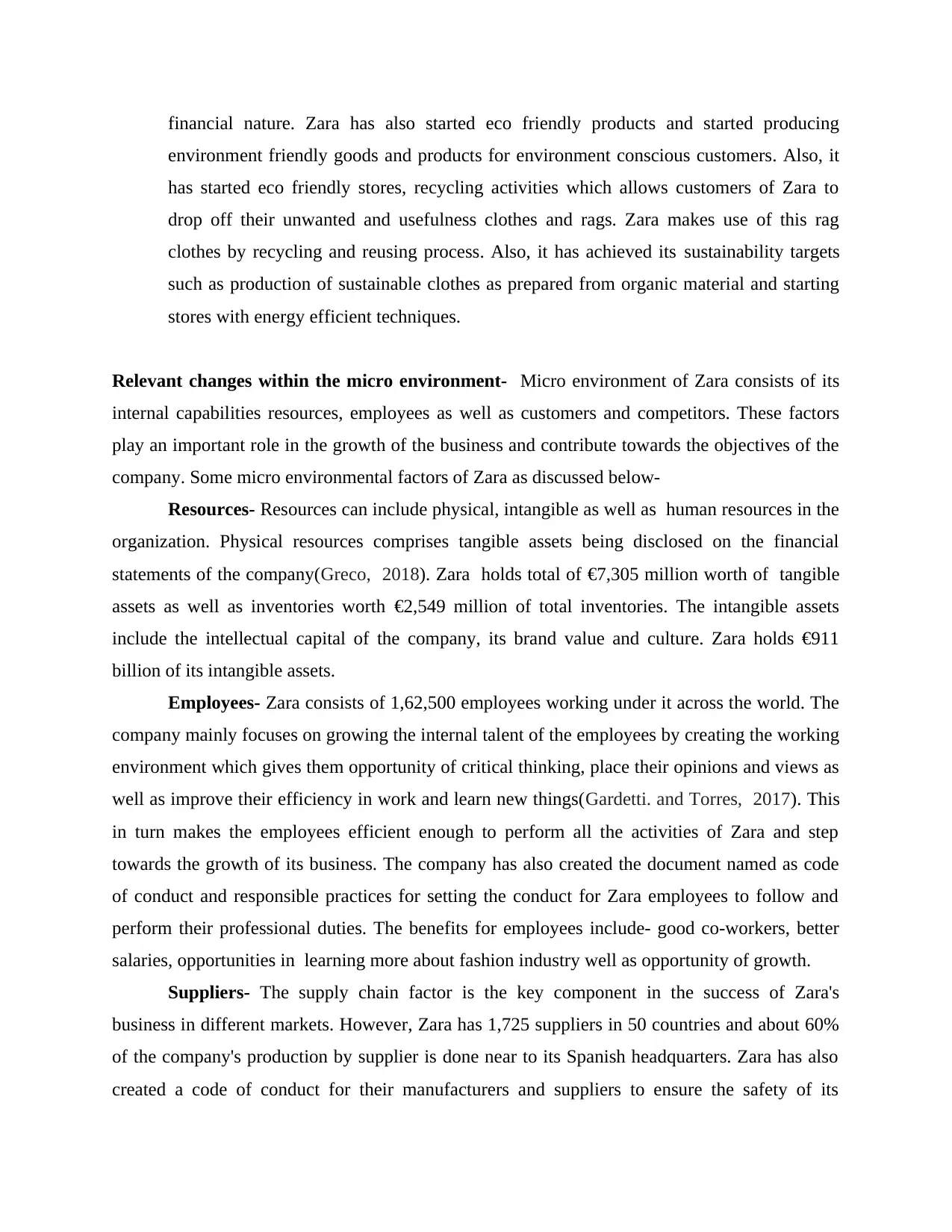
financial nature. Zara has also started eco friendly products and started producing
environment friendly goods and products for environment conscious customers. Also, it
has started eco friendly stores, recycling activities which allows customers of Zara to
drop off their unwanted and usefulness clothes and rags. Zara makes use of this rag
clothes by recycling and reusing process. Also, it has achieved its sustainability targets
such as production of sustainable clothes as prepared from organic material and starting
stores with energy efficient techniques.
Relevant changes within the micro environment- Micro environment of Zara consists of its
internal capabilities resources, employees as well as customers and competitors. These factors
play an important role in the growth of the business and contribute towards the objectives of the
company. Some micro environmental factors of Zara as discussed below-
Resources- Resources can include physical, intangible as well as human resources in the
organization. Physical resources comprises tangible assets being disclosed on the financial
statements of the company(Greco, 2018). Zara holds total of €7,305 million worth of tangible
assets as well as inventories worth €2,549 million of total inventories. The intangible assets
include the intellectual capital of the company, its brand value and culture. Zara holds €911
billion of its intangible assets.
Employees- Zara consists of 1,62,500 employees working under it across the world. The
company mainly focuses on growing the internal talent of the employees by creating the working
environment which gives them opportunity of critical thinking, place their opinions and views as
well as improve their efficiency in work and learn new things(Gardetti. and Torres, 2017). This
in turn makes the employees efficient enough to perform all the activities of Zara and step
towards the growth of its business. The company has also created the document named as code
of conduct and responsible practices for setting the conduct for Zara employees to follow and
perform their professional duties. The benefits for employees include- good co-workers, better
salaries, opportunities in learning more about fashion industry well as opportunity of growth.
Suppliers- The supply chain factor is the key component in the success of Zara's
business in different markets. However, Zara has 1,725 suppliers in 50 countries and about 60%
of the company's production by supplier is done near to its Spanish headquarters. Zara has also
created a code of conduct for their manufacturers and suppliers to ensure the safety of its
environment friendly goods and products for environment conscious customers. Also, it
has started eco friendly stores, recycling activities which allows customers of Zara to
drop off their unwanted and usefulness clothes and rags. Zara makes use of this rag
clothes by recycling and reusing process. Also, it has achieved its sustainability targets
such as production of sustainable clothes as prepared from organic material and starting
stores with energy efficient techniques.
Relevant changes within the micro environment- Micro environment of Zara consists of its
internal capabilities resources, employees as well as customers and competitors. These factors
play an important role in the growth of the business and contribute towards the objectives of the
company. Some micro environmental factors of Zara as discussed below-
Resources- Resources can include physical, intangible as well as human resources in the
organization. Physical resources comprises tangible assets being disclosed on the financial
statements of the company(Greco, 2018). Zara holds total of €7,305 million worth of tangible
assets as well as inventories worth €2,549 million of total inventories. The intangible assets
include the intellectual capital of the company, its brand value and culture. Zara holds €911
billion of its intangible assets.
Employees- Zara consists of 1,62,500 employees working under it across the world. The
company mainly focuses on growing the internal talent of the employees by creating the working
environment which gives them opportunity of critical thinking, place their opinions and views as
well as improve their efficiency in work and learn new things(Gardetti. and Torres, 2017). This
in turn makes the employees efficient enough to perform all the activities of Zara and step
towards the growth of its business. The company has also created the document named as code
of conduct and responsible practices for setting the conduct for Zara employees to follow and
perform their professional duties. The benefits for employees include- good co-workers, better
salaries, opportunities in learning more about fashion industry well as opportunity of growth.
Suppliers- The supply chain factor is the key component in the success of Zara's
business in different markets. However, Zara has 1,725 suppliers in 50 countries and about 60%
of the company's production by supplier is done near to its Spanish headquarters. Zara has also
created a code of conduct for their manufacturers and suppliers to ensure the safety of its
⊘ This is a preview!⊘
Do you want full access?
Subscribe today to unlock all pages.

Trusted by 1+ million students worldwide
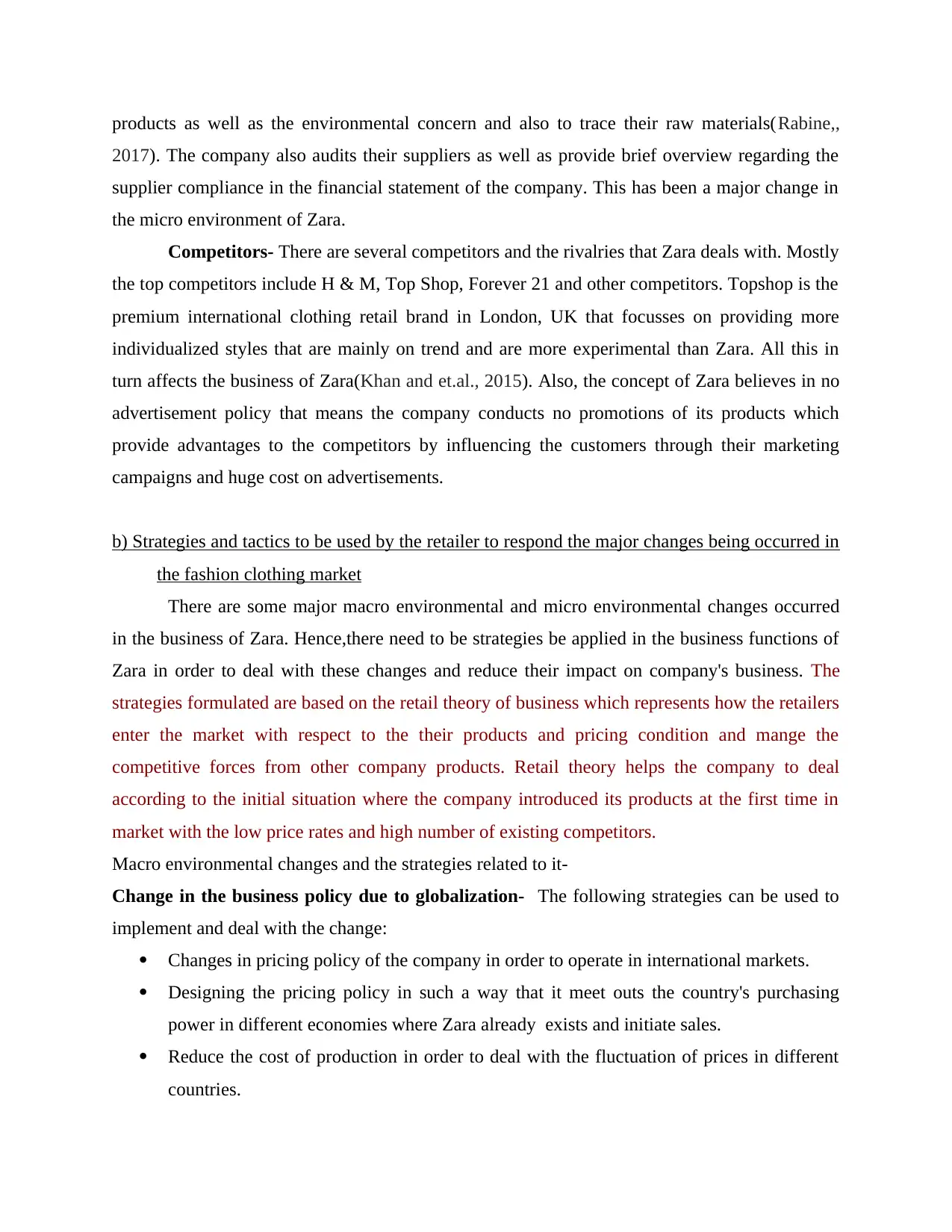
products as well as the environmental concern and also to trace their raw materials(Rabine,,
2017). The company also audits their suppliers as well as provide brief overview regarding the
supplier compliance in the financial statement of the company. This has been a major change in
the micro environment of Zara.
Competitors- There are several competitors and the rivalries that Zara deals with. Mostly
the top competitors include H & M, Top Shop, Forever 21 and other competitors. Topshop is the
premium international clothing retail brand in London, UK that focusses on providing more
individualized styles that are mainly on trend and are more experimental than Zara. All this in
turn affects the business of Zara(Khan and et.al., 2015). Also, the concept of Zara believes in no
advertisement policy that means the company conducts no promotions of its products which
provide advantages to the competitors by influencing the customers through their marketing
campaigns and huge cost on advertisements.
b) Strategies and tactics to be used by the retailer to respond the major changes being occurred in
the fashion clothing market
There are some major macro environmental and micro environmental changes occurred
in the business of Zara. Hence,there need to be strategies be applied in the business functions of
Zara in order to deal with these changes and reduce their impact on company's business. The
strategies formulated are based on the retail theory of business which represents how the retailers
enter the market with respect to the their products and pricing condition and mange the
competitive forces from other company products. Retail theory helps the company to deal
according to the initial situation where the company introduced its products at the first time in
market with the low price rates and high number of existing competitors.
Macro environmental changes and the strategies related to it-
Change in the business policy due to globalization- The following strategies can be used to
implement and deal with the change:
Changes in pricing policy of the company in order to operate in international markets.
Designing the pricing policy in such a way that it meet outs the country's purchasing
power in different economies where Zara already exists and initiate sales.
Reduce the cost of production in order to deal with the fluctuation of prices in different
countries.
2017). The company also audits their suppliers as well as provide brief overview regarding the
supplier compliance in the financial statement of the company. This has been a major change in
the micro environment of Zara.
Competitors- There are several competitors and the rivalries that Zara deals with. Mostly
the top competitors include H & M, Top Shop, Forever 21 and other competitors. Topshop is the
premium international clothing retail brand in London, UK that focusses on providing more
individualized styles that are mainly on trend and are more experimental than Zara. All this in
turn affects the business of Zara(Khan and et.al., 2015). Also, the concept of Zara believes in no
advertisement policy that means the company conducts no promotions of its products which
provide advantages to the competitors by influencing the customers through their marketing
campaigns and huge cost on advertisements.
b) Strategies and tactics to be used by the retailer to respond the major changes being occurred in
the fashion clothing market
There are some major macro environmental and micro environmental changes occurred
in the business of Zara. Hence,there need to be strategies be applied in the business functions of
Zara in order to deal with these changes and reduce their impact on company's business. The
strategies formulated are based on the retail theory of business which represents how the retailers
enter the market with respect to the their products and pricing condition and mange the
competitive forces from other company products. Retail theory helps the company to deal
according to the initial situation where the company introduced its products at the first time in
market with the low price rates and high number of existing competitors.
Macro environmental changes and the strategies related to it-
Change in the business policy due to globalization- The following strategies can be used to
implement and deal with the change:
Changes in pricing policy of the company in order to operate in international markets.
Designing the pricing policy in such a way that it meet outs the country's purchasing
power in different economies where Zara already exists and initiate sales.
Reduce the cost of production in order to deal with the fluctuation of prices in different
countries.
Paraphrase This Document
Need a fresh take? Get an instant paraphrase of this document with our AI Paraphraser
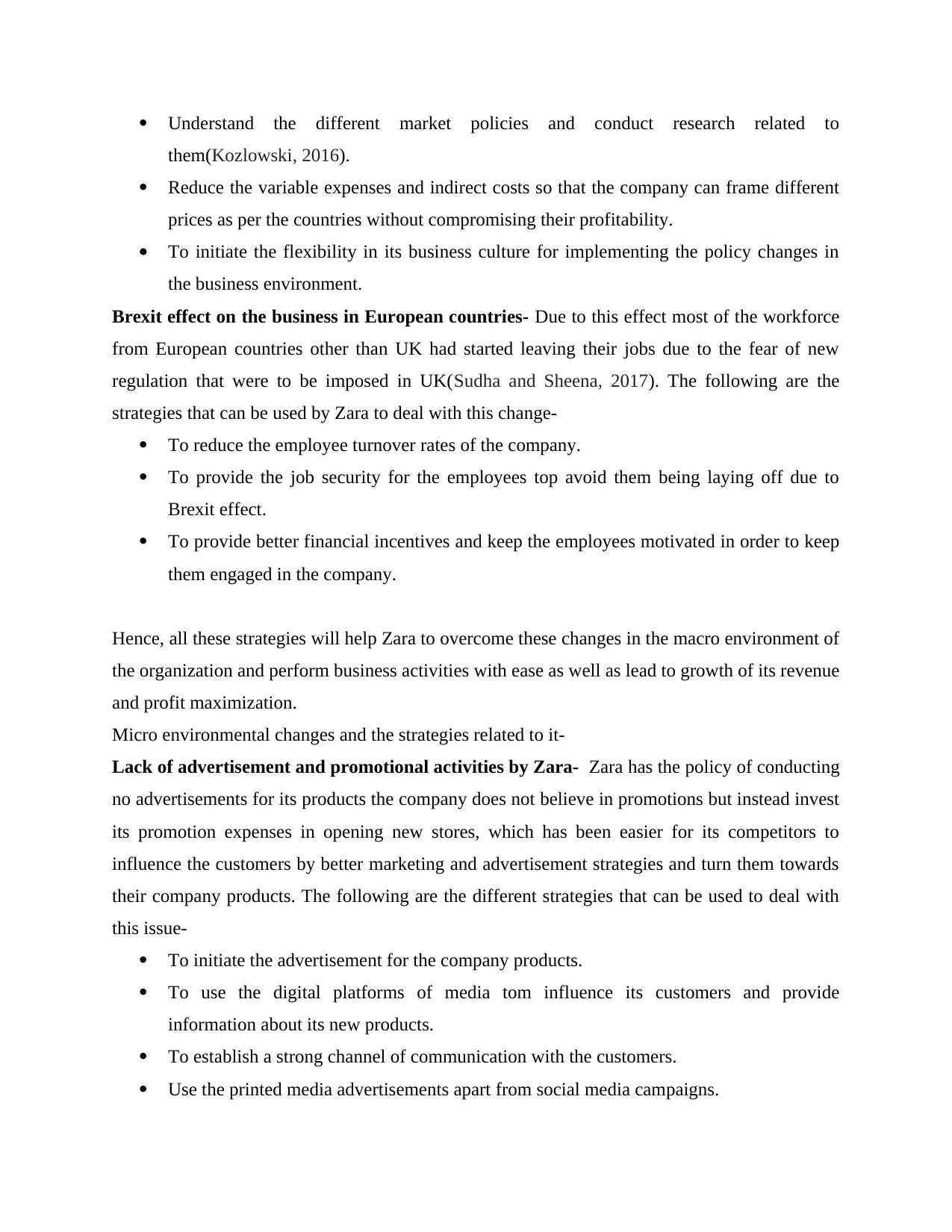
Understand the different market policies and conduct research related to
them(Kozlowski, 2016).
Reduce the variable expenses and indirect costs so that the company can frame different
prices as per the countries without compromising their profitability.
To initiate the flexibility in its business culture for implementing the policy changes in
the business environment.
Brexit effect on the business in European countries- Due to this effect most of the workforce
from European countries other than UK had started leaving their jobs due to the fear of new
regulation that were to be imposed in UK(Sudha and Sheena, 2017). The following are the
strategies that can be used by Zara to deal with this change-
To reduce the employee turnover rates of the company.
To provide the job security for the employees top avoid them being laying off due to
Brexit effect.
To provide better financial incentives and keep the employees motivated in order to keep
them engaged in the company.
Hence, all these strategies will help Zara to overcome these changes in the macro environment of
the organization and perform business activities with ease as well as lead to growth of its revenue
and profit maximization.
Micro environmental changes and the strategies related to it-
Lack of advertisement and promotional activities by Zara- Zara has the policy of conducting
no advertisements for its products the company does not believe in promotions but instead invest
its promotion expenses in opening new stores, which has been easier for its competitors to
influence the customers by better marketing and advertisement strategies and turn them towards
their company products. The following are the different strategies that can be used to deal with
this issue-
To initiate the advertisement for the company products.
To use the digital platforms of media tom influence its customers and provide
information about its new products.
To establish a strong channel of communication with the customers.
Use the printed media advertisements apart from social media campaigns.
them(Kozlowski, 2016).
Reduce the variable expenses and indirect costs so that the company can frame different
prices as per the countries without compromising their profitability.
To initiate the flexibility in its business culture for implementing the policy changes in
the business environment.
Brexit effect on the business in European countries- Due to this effect most of the workforce
from European countries other than UK had started leaving their jobs due to the fear of new
regulation that were to be imposed in UK(Sudha and Sheena, 2017). The following are the
strategies that can be used by Zara to deal with this change-
To reduce the employee turnover rates of the company.
To provide the job security for the employees top avoid them being laying off due to
Brexit effect.
To provide better financial incentives and keep the employees motivated in order to keep
them engaged in the company.
Hence, all these strategies will help Zara to overcome these changes in the macro environment of
the organization and perform business activities with ease as well as lead to growth of its revenue
and profit maximization.
Micro environmental changes and the strategies related to it-
Lack of advertisement and promotional activities by Zara- Zara has the policy of conducting
no advertisements for its products the company does not believe in promotions but instead invest
its promotion expenses in opening new stores, which has been easier for its competitors to
influence the customers by better marketing and advertisement strategies and turn them towards
their company products. The following are the different strategies that can be used to deal with
this issue-
To initiate the advertisement for the company products.
To use the digital platforms of media tom influence its customers and provide
information about its new products.
To establish a strong channel of communication with the customers.
Use the printed media advertisements apart from social media campaigns.
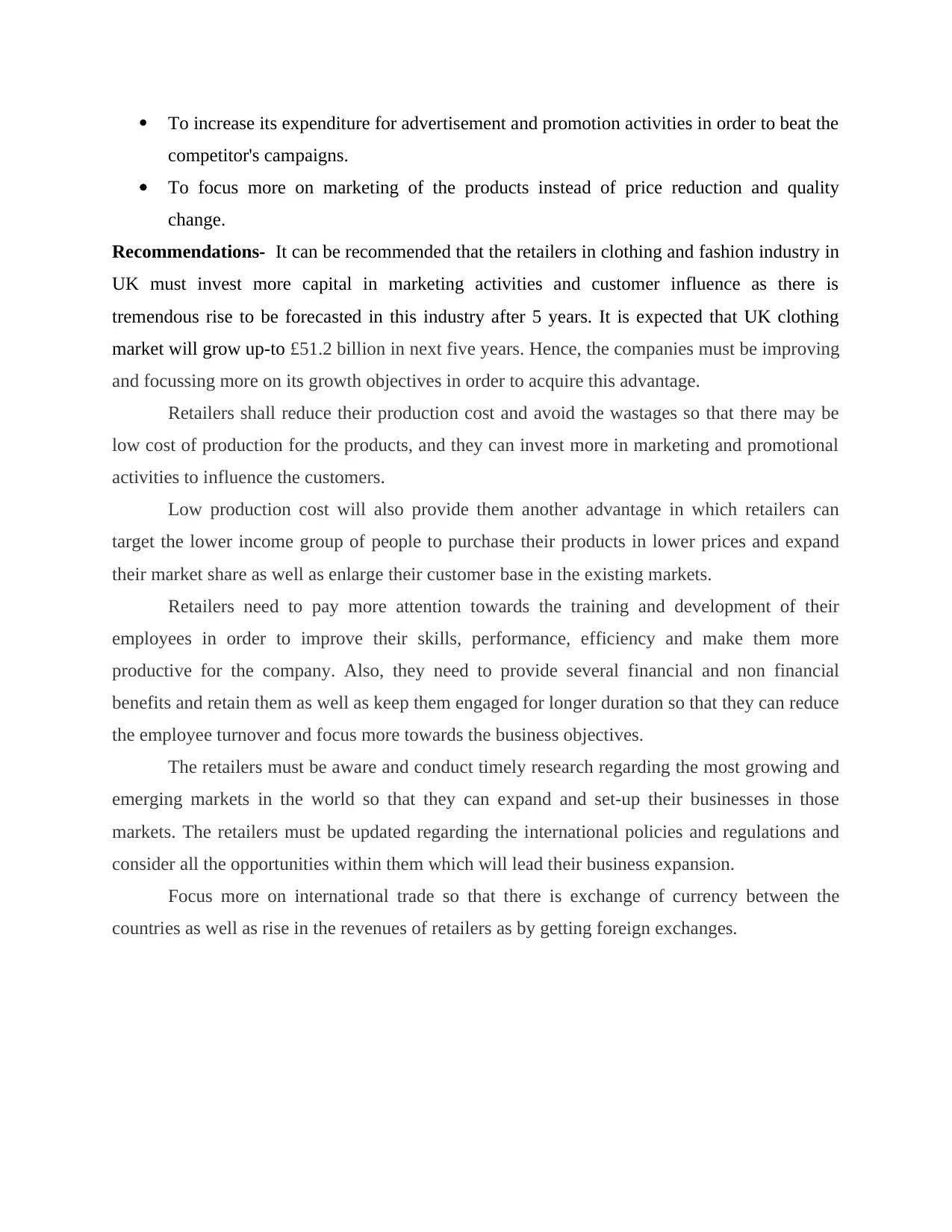
To increase its expenditure for advertisement and promotion activities in order to beat the
competitor's campaigns.
To focus more on marketing of the products instead of price reduction and quality
change.
Recommendations- It can be recommended that the retailers in clothing and fashion industry in
UK must invest more capital in marketing activities and customer influence as there is
tremendous rise to be forecasted in this industry after 5 years. It is expected that UK clothing
market will grow up-to £51.2 billion in next five years. Hence, the companies must be improving
and focussing more on its growth objectives in order to acquire this advantage.
Retailers shall reduce their production cost and avoid the wastages so that there may be
low cost of production for the products, and they can invest more in marketing and promotional
activities to influence the customers.
Low production cost will also provide them another advantage in which retailers can
target the lower income group of people to purchase their products in lower prices and expand
their market share as well as enlarge their customer base in the existing markets.
Retailers need to pay more attention towards the training and development of their
employees in order to improve their skills, performance, efficiency and make them more
productive for the company. Also, they need to provide several financial and non financial
benefits and retain them as well as keep them engaged for longer duration so that they can reduce
the employee turnover and focus more towards the business objectives.
The retailers must be aware and conduct timely research regarding the most growing and
emerging markets in the world so that they can expand and set-up their businesses in those
markets. The retailers must be updated regarding the international policies and regulations and
consider all the opportunities within them which will lead their business expansion.
Focus more on international trade so that there is exchange of currency between the
countries as well as rise in the revenues of retailers as by getting foreign exchanges.
competitor's campaigns.
To focus more on marketing of the products instead of price reduction and quality
change.
Recommendations- It can be recommended that the retailers in clothing and fashion industry in
UK must invest more capital in marketing activities and customer influence as there is
tremendous rise to be forecasted in this industry after 5 years. It is expected that UK clothing
market will grow up-to £51.2 billion in next five years. Hence, the companies must be improving
and focussing more on its growth objectives in order to acquire this advantage.
Retailers shall reduce their production cost and avoid the wastages so that there may be
low cost of production for the products, and they can invest more in marketing and promotional
activities to influence the customers.
Low production cost will also provide them another advantage in which retailers can
target the lower income group of people to purchase their products in lower prices and expand
their market share as well as enlarge their customer base in the existing markets.
Retailers need to pay more attention towards the training and development of their
employees in order to improve their skills, performance, efficiency and make them more
productive for the company. Also, they need to provide several financial and non financial
benefits and retain them as well as keep them engaged for longer duration so that they can reduce
the employee turnover and focus more towards the business objectives.
The retailers must be aware and conduct timely research regarding the most growing and
emerging markets in the world so that they can expand and set-up their businesses in those
markets. The retailers must be updated regarding the international policies and regulations and
consider all the opportunities within them which will lead their business expansion.
Focus more on international trade so that there is exchange of currency between the
countries as well as rise in the revenues of retailers as by getting foreign exchanges.
⊘ This is a preview!⊘
Do you want full access?
Subscribe today to unlock all pages.

Trusted by 1+ million students worldwide
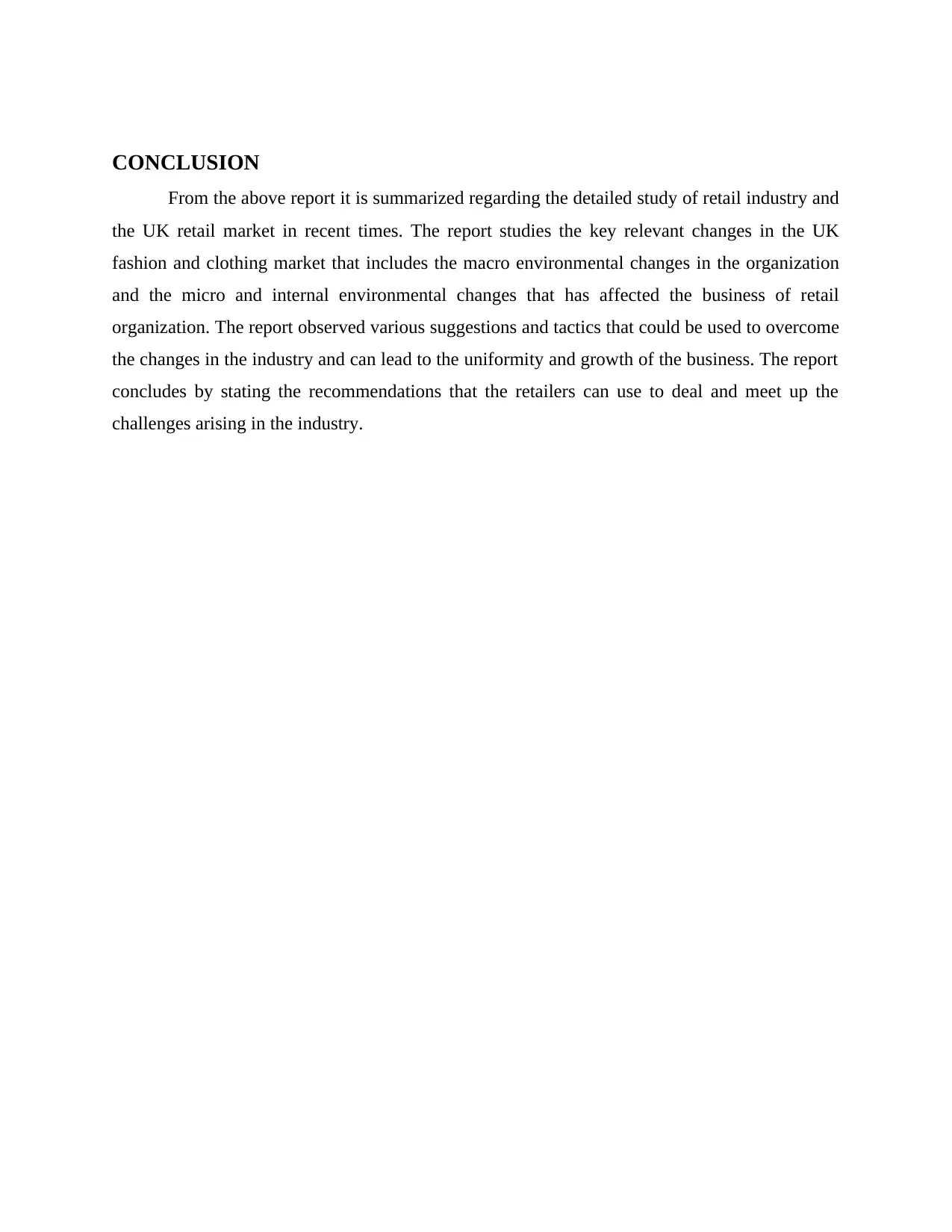
CONCLUSION
From the above report it is summarized regarding the detailed study of retail industry and
the UK retail market in recent times. The report studies the key relevant changes in the UK
fashion and clothing market that includes the macro environmental changes in the organization
and the micro and internal environmental changes that has affected the business of retail
organization. The report observed various suggestions and tactics that could be used to overcome
the changes in the industry and can lead to the uniformity and growth of the business. The report
concludes by stating the recommendations that the retailers can use to deal and meet up the
challenges arising in the industry.
From the above report it is summarized regarding the detailed study of retail industry and
the UK retail market in recent times. The report studies the key relevant changes in the UK
fashion and clothing market that includes the macro environmental changes in the organization
and the micro and internal environmental changes that has affected the business of retail
organization. The report observed various suggestions and tactics that could be used to overcome
the changes in the industry and can lead to the uniformity and growth of the business. The report
concludes by stating the recommendations that the retailers can use to deal and meet up the
challenges arising in the industry.
Paraphrase This Document
Need a fresh take? Get an instant paraphrase of this document with our AI Paraphraser
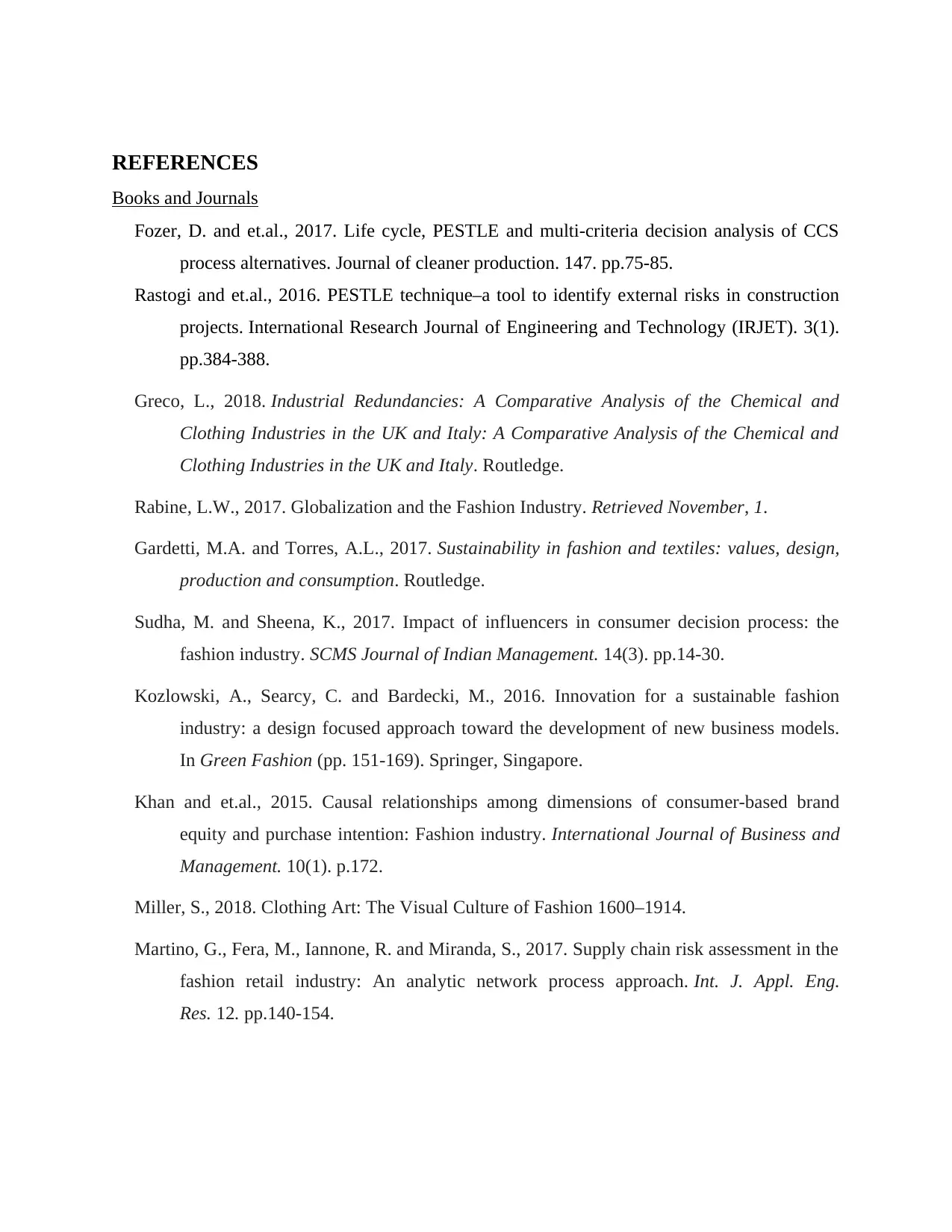
REFERENCES
Books and Journals
Fozer, D. and et.al., 2017. Life cycle, PESTLE and multi-criteria decision analysis of CCS
process alternatives. Journal of cleaner production. 147. pp.75-85.
Rastogi and et.al., 2016. PESTLE technique–a tool to identify external risks in construction
projects. International Research Journal of Engineering and Technology (IRJET). 3(1).
pp.384-388.
Greco, L., 2018. Industrial Redundancies: A Comparative Analysis of the Chemical and
Clothing Industries in the UK and Italy: A Comparative Analysis of the Chemical and
Clothing Industries in the UK and Italy. Routledge.
Rabine, L.W., 2017. Globalization and the Fashion Industry. Retrieved November, 1.
Gardetti, M.A. and Torres, A.L., 2017. Sustainability in fashion and textiles: values, design,
production and consumption. Routledge.
Sudha, M. and Sheena, K., 2017. Impact of influencers in consumer decision process: the
fashion industry. SCMS Journal of Indian Management. 14(3). pp.14-30.
Kozlowski, A., Searcy, C. and Bardecki, M., 2016. Innovation for a sustainable fashion
industry: a design focused approach toward the development of new business models.
In Green Fashion (pp. 151-169). Springer, Singapore.
Khan and et.al., 2015. Causal relationships among dimensions of consumer-based brand
equity and purchase intention: Fashion industry. International Journal of Business and
Management. 10(1). p.172.
Miller, S., 2018. Clothing Art: The Visual Culture of Fashion 1600–1914.
Martino, G., Fera, M., Iannone, R. and Miranda, S., 2017. Supply chain risk assessment in the
fashion retail industry: An analytic network process approach. Int. J. Appl. Eng.
Res. 12. pp.140-154.
Books and Journals
Fozer, D. and et.al., 2017. Life cycle, PESTLE and multi-criteria decision analysis of CCS
process alternatives. Journal of cleaner production. 147. pp.75-85.
Rastogi and et.al., 2016. PESTLE technique–a tool to identify external risks in construction
projects. International Research Journal of Engineering and Technology (IRJET). 3(1).
pp.384-388.
Greco, L., 2018. Industrial Redundancies: A Comparative Analysis of the Chemical and
Clothing Industries in the UK and Italy: A Comparative Analysis of the Chemical and
Clothing Industries in the UK and Italy. Routledge.
Rabine, L.W., 2017. Globalization and the Fashion Industry. Retrieved November, 1.
Gardetti, M.A. and Torres, A.L., 2017. Sustainability in fashion and textiles: values, design,
production and consumption. Routledge.
Sudha, M. and Sheena, K., 2017. Impact of influencers in consumer decision process: the
fashion industry. SCMS Journal of Indian Management. 14(3). pp.14-30.
Kozlowski, A., Searcy, C. and Bardecki, M., 2016. Innovation for a sustainable fashion
industry: a design focused approach toward the development of new business models.
In Green Fashion (pp. 151-169). Springer, Singapore.
Khan and et.al., 2015. Causal relationships among dimensions of consumer-based brand
equity and purchase intention: Fashion industry. International Journal of Business and
Management. 10(1). p.172.
Miller, S., 2018. Clothing Art: The Visual Culture of Fashion 1600–1914.
Martino, G., Fera, M., Iannone, R. and Miranda, S., 2017. Supply chain risk assessment in the
fashion retail industry: An analytic network process approach. Int. J. Appl. Eng.
Res. 12. pp.140-154.
1 out of 11
Related Documents
Your All-in-One AI-Powered Toolkit for Academic Success.
+13062052269
info@desklib.com
Available 24*7 on WhatsApp / Email
![[object Object]](/_next/static/media/star-bottom.7253800d.svg)
Unlock your academic potential
Copyright © 2020–2026 A2Z Services. All Rights Reserved. Developed and managed by ZUCOL.





